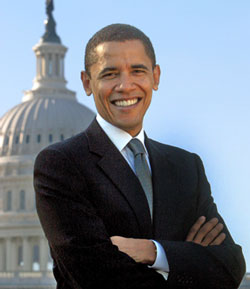and Saeed Shabazz
Staff Writers

WASHINGTON (FinalCall.com) – Sen. Barack Obama is the preferred U.S. presidential candidate in all 22 nations polled for the BBC World Service by the University of Maryland and Globescan.
“We did this same poll in 2004 and most of the countries went for Sen. Kerry. We felt there would be a more even split this time. We felt people would see improvements with either candidate. We were surprised to see that people thought problems would improve with Sen. Obama,” Dr. Stephen Kull told The Final Call“ The Bush policies have affected worldwide opinion. (John) McCain is seen as a continuation of the Bush policies.”
Dr. Kull is the director of the Program on International Policy Attitudes at the University of Maryland.
On average, Sen. Obama was preferred by a four to one margin (49 percent to 12 percent) over his Republican rival in the poll of 22,000 people.
But the margin ranged widely across nations, with Sen. Obama favored by nine percent in India to 82 percent in Kenya. Nearly 40 percent of those surveyed did not take a position. This was particularly the case in Russia, Turkey and Egypt.
The results are drawn from surveys of 22,531 adult citizens across 22 countries and a parallel poll of 1,000 U.S. adult citizens between July 8, 2008 and August 27, 2008.
The countries polled included Canada, Mexico, Panama, Brazil, United Kingdom, Germany, Poland, France, Italy, Turkey, Lebanon, United Arab Emirates, Egypt, Nigeria, Kenya, Russia, India, China, Singapore, Indonesia, Australia and the Philippines.
“These countries represent 60 percent of the world’s population,” Dr. Kull said. “There is a perception that with an Obama presidency things would improve. His trip to Europe helped him. Plus his words that he’s a global citizen have resonated around the world.”
“Both McCain and Obama have expressed concern about climate change but the issue of the Iraq War stands out for people. The war is very unpopular around the world. McCain supported the war and Obama didn’t.”
He added, “Another big concern is the U.S. restraint in using its military power. It’s the largest military in the world. McCain is seen as being freer to use military power while Obama is seen as using restraint.”
The German Language Service of Agence-France Presse (AFP) noted that the U.S. presidential campaign is a huge issue in Germany where 250,000 came out to see Mr. Obama. Germans “are fed up” with the present U.S. government and 90 percent of Germans polled prefer Mr. Obama, said the news agency.
“Iraq is an issue, of course. The war in Iraq has been very unpopular in Germany,” the news service said, adding, “Afghanistan is another issue. Germany is involved in Afghanistan; the German army is there, but it’s not a very popular thing among Germans.”
In a separate poll conducted in the U.S., Americans also said an Obama presidency would improve U.S. relations with the world more than a McCain administration, with 46 percent of Americans expecting international relations to improve if Mr. Obama is elected compared to 30 percent for Mr. McCain.
Swinging over to South America and O Globo of Brazil: “The image of Obama is very powerful. A Black man as a presidential candidate is something that can really change America’s image around the world.”
Mexico’s Grupo Imagen radio reported that some feel Sen. Obama doesn’t know that their nation exists. “He went on a tour through Europe and the Middle East, but Mexico was not even on his map,” observed a commentator. “So, that’s something that worries us, to have the candidates look towards other regions and forget Latin America.”
Mohamed Elmenshawy, editor in chief of Taqrir Washington and Arab Insight, projects of the World Security Institute in Washington, D.C. wrote, “Obama’s appeal in the Arab world is both evident and elusive. The unexpected nomination of a candidate with Muslim roots by the American people carries an obvious symbolic value.
“Many embrace this as a harbinger of solidarity between Americans and the Muslim world. Moreover, young Arabs and Muslims hear promise for their own societies in Obama’s campaign slogan of ‘hope and change.’ To them, Obama’s message heralds progress both in American policymaking and at home.”
“Electing a president of African heritage could prove to be America’s ultimate defense against attacks from its critics, and an effective strategy in the push to win hearts and minds in the Arab world,” said Mr. Elmenshawy. “If he is elected, Obama’s message will become an international inspiration. This is especially true in the Middle East, where populations exasperated by poverty and corruption covet increased civil liberties and functional democracy.”
A senior Arab diplomat in Washington expressed a different view. “America does not deserve a president like Obama,” the diplomat said.












